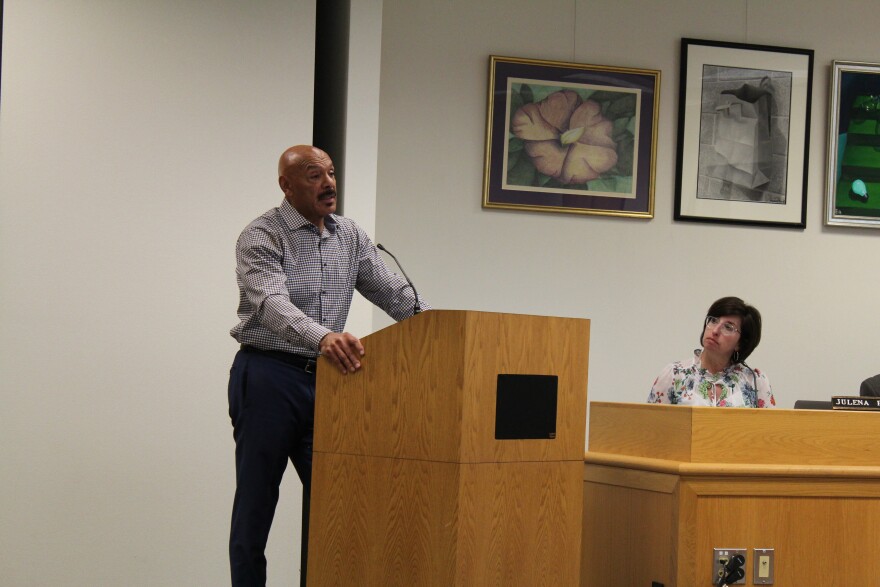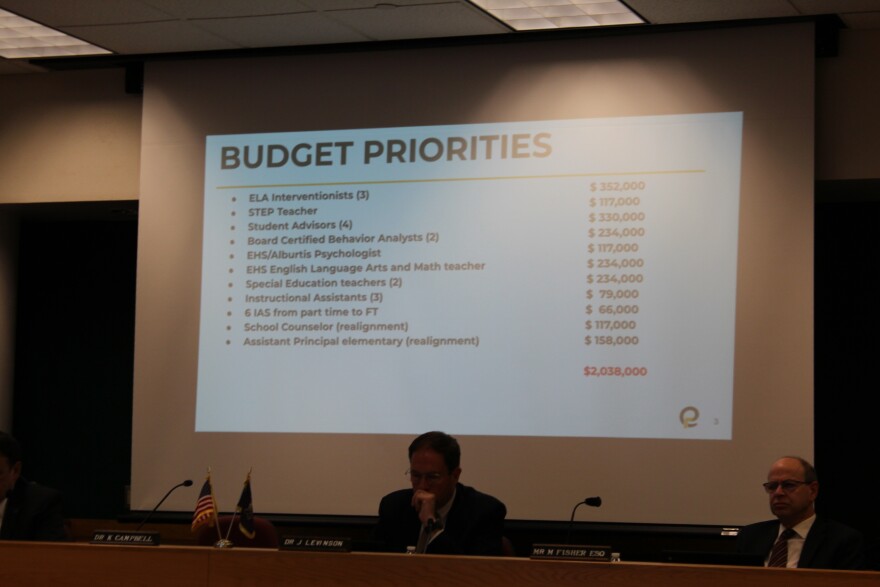EMMAUS, Pa. — In a push for greater student support, East Penn School District's administration is asking for about two dozen new hires for the upcoming school year as special COVID-related funding dries up and faculty seek to make positions permanent.
If fully adopted, the positions are anticipated to cost $2,038,000, adding to an already anticipated tax increase for the district.
The positions include three ELA interventionists, a STEP (students in transition educational program) teacher, four student advisors and two board certified behavior analysts.
Also, a new psychologist for Emmaus High School and Alburtis Elementary school, a new English language arts and a math teacher at Emmaus High School.
Also, two special education teachers, three instructional assistants and a new school counselor and new assistant principal to assist with realignment efforts.
Positions in proposed tax hike
At Monday's School Board meeting, administration and faculty made arguments for the ELA interventionists, STEP teacher, advisors and behavior analysts.
Officials say those positions are included in the 5.95% property tax increase discussed in recent meetings.
According to district documentation, that would be the largest increase in a decade and is driven by increasing expenses in items such as salaries, benefits and charter school tuition.
Capital project millage phase-in plans for the massive facilities expansion and grade realignment plan being studied also have been incorporated into the draft budget.
Superintendent Kristen Campbell said that if the priorities were to be removed, the tax increase would be reduced to 4.1%, based on current projections.
The rest of the positions will be elaborated on during the board's April 22 meeting.
Administrators also plan an update on the budgeting at that meeting, which may include a change in projected tax increase.
The positions echo theprior year's staffing requests, which also centered on interventions and support for struggling students.
Pitch to continue programs
Budget Priorities by LehighValley Newsdotcom on Scribd
The positions discussed Monday would continue, under district funding, what were programs funded by temporary ESSER (Elementary and Secondary School Emergency Relief) funding that the district received from federal COVID-19 pandemic relief bills.
The district still has about $1.2 million of those funds left for the next year, but depleting that money now has those in the district deciding what is worth paying to continue.
"We have to make the difficult decision in terms of being strategic and looking at the vision down the road," Campbell said, referencing the choice to not continue one of two STEP teacher positions.
"Every year, we have to continue to identify those priorities and some of those positions will not continue to be sustainable."
ELA interventionists rely on student data to assist groups of students in need to bring their skills to grade level. It is proposed to have one in each of the district's secondary education buildings — Eyer Middle School, Lower Macungie Middle School and Emmaus High School.

Administration officials said district interventionists are helping a current pool of about 1,500 students improve their reading in the district, mostly in the elementary schools.
Without the additional interventionists, monitored focus shifts from the 40th percentile and below to the 15th percentile and below, cutting down the number of students behind that would be able to get that help by about half.
'Forming good relationships'
A STEP teacher at Lower Macungie Middle School serving grades 7-8 would provide programming to students with challenges attending school or being successful in an academic setting.
To fight truancy, the position would offer an individualized program in a smaller classroom size while working to improve students' emotional skills.
Last year, STEP teachers served 30 students in LMMS and 24 students at Eyer Middle School.
Assistant Superintendent Laura Witman said it can be a cost-saving measure, preventing a student being pulled to alternative placement, and spoke to the benefit the programs has provided.
"If there was a silver lining to some of the difficult things that we experienced through COVID, I do think it was the ability to pilot these things in front of you in this district and then again share the stories, and also the data," Witman said.
Four student advisors — one for each middle school and two for Emmaus High School — support students in various social interventions.
They conduct check-ins and provide mentoring and general advising opportunities, with the goal of positively impacting school culture, rather than serve as disciplinary officers.
"The whole emphasis of what we do is based on forming good relationships," East Penn school advisor Lenny Jenkins said.
"We're able to acquire a wealth of information from the students, when you just sit back and let them talk, let them present themselves out.
"They're not used to being listened to, and that's what we decided to provide for them."

Designing intervention
The proposed behavioral analysts are part of the district's autistic support and emotional support programs.
They would design interventions based on behavioral conditioning to help students build behavior support plans in response to behaviors that are otherwise disruptive or not helpful to learning.
Current Board Certified Behavior Analysts were contracted through an outside provider utilizing ESSER funding.
Campbell referenced the Multi-Tiered System of Support when discussing these proposals. It's the framework for levels of supports and intervention for students in academic or behavioral need.
The level of intervention need is determined by screenings which occur three times in a school year.
A targeted state improvement designation for students with special needs and placed into individualized education programs was made for this school year, prompting the district to take further support efforts in Math as well as English courses.
Officials support steps
Board Vice President Adam Smith and members Alisa Bowman, Michael Felegy, Shonta Ford and Jeffrey Jankowski had positive comments about the proposals.
"I'm absolutely thrilled that we have been able to provide our students with this through ESSER funds," Board Vice President Adam Smith said, referencing the STEP program and voicing support for the other proposals.
"I don't see them as a as a luxury."
Board member Michael Felegy said he would support it so long as the cost is reasonable. He said his son benefitted from such intervention programs in elementary school and they're needed.
"For this amount of money, in my mind it is worth it for every student to have every opportunity they can to a certain extent," Felegy said. "I've just seen how it works. I know how it works."
"Don't hold me to it, but I'm willing to move forward with these programs."

